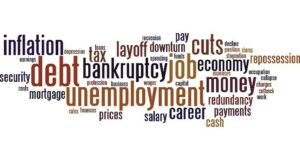Ariana Fidelis, Doctoral student in psychology at the Pontifical Catholic University of Goiás, Goiânia, GO, Brazil.

Image: Pixabay
The article “Well-being of unemployed people: relations with the value of work and unemployment time“, published in the journal Estudos de Psicologia (Campinas, vol. 38) discusses the moderate power of unemployment time in the relationship between the value of work and psychological well-being. In past years it has been observed that events at the macro-social level, such as unemployment and its relationship with psychological variables, such as well-being, have aroused greater interest in the social sciences. One of the reasons that explains this significant increase in studies is the fact that unemployment is one of the most devastating consequences for well-being, whether prolonged or not.
This quantitative research involved 256 participants, 77 male and 188 females with an average age of 27 years, most of them with complete high school education, who at the time of the research were unemployed in the city of Goiânia. Data collection was done through electronic questionnaires composed of the scales of Positive and Negative Affections, Flourishing and the Scale of Intrinsic Values of the work and sociodemographic data, later submitted to statistical analysis.
The results of hierarchical regression analyze show that the duration of unemployment acts as a moderator in the relationship between the value of work and psychological well-being, so that the longer the duration of unemployment, the greater the psychological well-being of people. Consequently, the shorter the duration of unemployment, the greater the experience of negative feelings. This happens because, as the unemployment time increases, the state of pain and torpor decreases, which allows the appearance of positive aspects such as motivation and feelings of excitement that provide well-being, with other factors such as social support, security plans, among others.
These findings reinforce the assumptions that the unemployment situation is not bad for all people. That because unemployed individuals, despite facing a troubled moment, they are not passive victims and, in general, they react to unemployment with various coping strategies in order to maintain their own psychological balance and protect themselves. As seen, other factors such as the value of work, social support, optimism, identification with the task, protection policies, unemployment insurance, duration of unemployment can provide a positive confrontation of this situation and protection against the well-being. Thus, when analyzing the unemployment situation, it is important to consider such factors and the duration as these can influence well-being.
It is hoped that these results can contribute to the scientific community in general and encourage new research, in the incessant task of investigating which factors and circumstances lead some people, who, despite facing moments of extreme difficulty and limitation, as is the case of unemployment, they are still able for multiple factors to continue going on in their lives, conquering spaces and advancing their future. Despite the results showing that the unemployed are able to reframe painful situations such as job loss, bringing the work importance in humans to achieve goals, unemployment is still a phenomenon with different nuances, which destabilizes and excludes many individuals.
Following, watch the video of researcher Ariana Fidelis expanding the discussion of the study.
References
MOUSTERI, V.; DALY, M. and DELANEY, L. The scarring effect of unemployment on psychological well-being across Europe. Social Science Research [online]. 2018, vol. 72, pp. 146-169, ISSN: 0049-089X [viewed 1 September 2020]. DOI: 10.1016/j.ssresearch.2018.01.007. Available from: https://www.sciencedirect.com/science/article/abs/pii/S0049089X17307299
NEKOEI, A. and WEBER, A. Does extending unemployment benefits improve job quality? American Economic Review, [online]. 2017, vol. 107, no. 2, pp. 527-561, e-ISSN 1944-7981 [viewed 1 September 2020]. DOI: 10.1257/aer.20150528. Available from: https://www.aeaweb.org/articles?id=10.1257/aer.20150528
To read the article, access
FIDELIS, A. and MENDONÇA, H. Well-being of unemployed people: relations with work values and time of unemployment. Estud. psicol. (Campinas) [online]. 2021, vol. 38, e190014, ISSN: 1982-0275 [viewed 2 September 2020]. DOI: 10.1590/1982-0275202138e190014. Available from: http://ref.scielo.org/4pbbx5
External link
Estudos de Psicologia (Campinas) – ESTPSI: www.scielo.br/estpsi
Como citar este post [ISO 690/2010]:

















Recent Comments